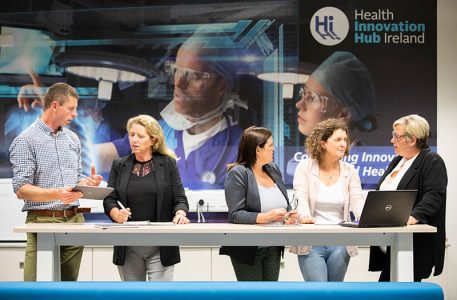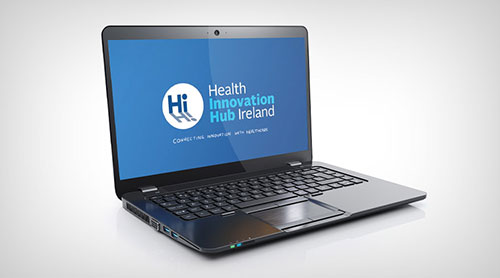If we can’t change how we work in the system, the system simply won’t change.
In Ireland today we have nine of the global top ten pharma companies and 18 of the top 25 medical device companies. Lesser known, is that we have 300 indigenous health tech companies, about 15 for each of the global. So for every one of the big players, we have around 15 innovative indigenous enterprises. Critical Healthcare has developed a product, MediQuilt, the first-ever re-usable trolley Quilt and disposable cover a risk free cost effective solution. TickerFit, allows healthcare professionals to effectively prescribe and monitor lifestyle intervention using a web based application and passive monitoring using smartphone or wearable devices.
The exciting thing for us here working in the healthcare sector, is that Ireland is ideally placed to be a world leader in the provision of total connected health solutions. We have a highly networked ecosystem and the industry expertise required to embrace the convergence between health and the Internet of Things (IoT), which is the future of healthcare globally.
Conversely, the difficulty for us here in the Irish healthcare system is harnessing this innovation. It takes time to embrace the future and most of the medical community in this country is trying to maintain balance in our present system. No easy feat. The total spend on healthcare here is among the highest in the OECD. While our health outcomes – what we get for spending money – tends to be comparatively poor. Money, it seems is not the only answer, so in a system under immense pressure what can we do differently?
Health Innovation Hub Ireland (HIHI) was established by the Department of Business, Enterprise and Innovation and the Department of Health, supported by Enterprise Ireland (EI) and the Health Service Executive (HSE) to drive collaboration between the health service and enterprise. It offers companies the opportunity for pilot and clinical validation studies and the health service access to innovative products, services and devices that they may not otherwise be exposed to.
HIHI is built on the recognition that collaboration with enterprise can benefit patient care, patient pathways and outcomes. A simple example is that of ViClarity. Originally designed for the financial services industry, ViClarity has a tool that monitors compliance with regulatory standards. In late 2016, ViClarity engaged with HIHI to define a pilot study in Killarney Community Hospital. The study was driven by the desire to improve on the manual auditing and compliance measurements, within the hospital.
The HIHI study ran for a period of three months. Following onsite training by ViClarity the study was implemented across four units within the Killarney Community Hospital. The traditional paper based audits were built into system workflow and automated. The workflow was then delegated to the relevant staff members within the hospital. Staff used the ViClarity tool to complete audits, gather audit data and input this directly into the system.
Through the HIHI study, Killarney Community Hospital used ViClarity to transform from a time consuming paper based system to computer based auditing. This means instant results, immediate compliance status visibility and ownership of audit responsibilities.
There were at least 124 hours saved in admin time for the hospital through using the computer based system. Time that can potentially be spent on patient care.
For ViClarity, HIHI secured their first clinical pilot in a public hospital. The company continues to leverage the overwhelmingly positive results of the HIHI study both in the domestic and international markets, when making the ViClarity pitch. It has secured a high profile client base with healthcare companies such as Mowlam, MHA and most recently the NHS began using its technology solution.
One of the most reassuring services offered to hospitals by HIHI is the management process we deliver, through which companies’ engage with the health system. Once we have matched a suitable clinical team with an industry partner and both wish to pursue a study or pilot, we draw up a project scope. This project initiation document, which both parties agree, covers objectives, requirements, responsibilities and timeframe, which we oversee and manage throughout the study or pilot.
HIHI works directly with three hospital groups (South/South West, Dublin Midlands and Saolta in the West/North West), but the HIHI network can access all acute and community hospitals, pharmacies, primary care centres and healthcare centres.
HIHI and its partners, not least among them the HSE, want to look at solutions for the long-term, not just to get by in the short-term. Through HIHI we can all be allies to innovation. If we can’t change how we work in the system, the system simply won’t change.
Dr Colman Casey, HIHI National Director.
Originally published by Health Manager’s Journal: https://www.healthmanager.ie/2018/06/ireland-ideally-placed-to-be-a-world-leader-in-total-connected-health-solutions/









